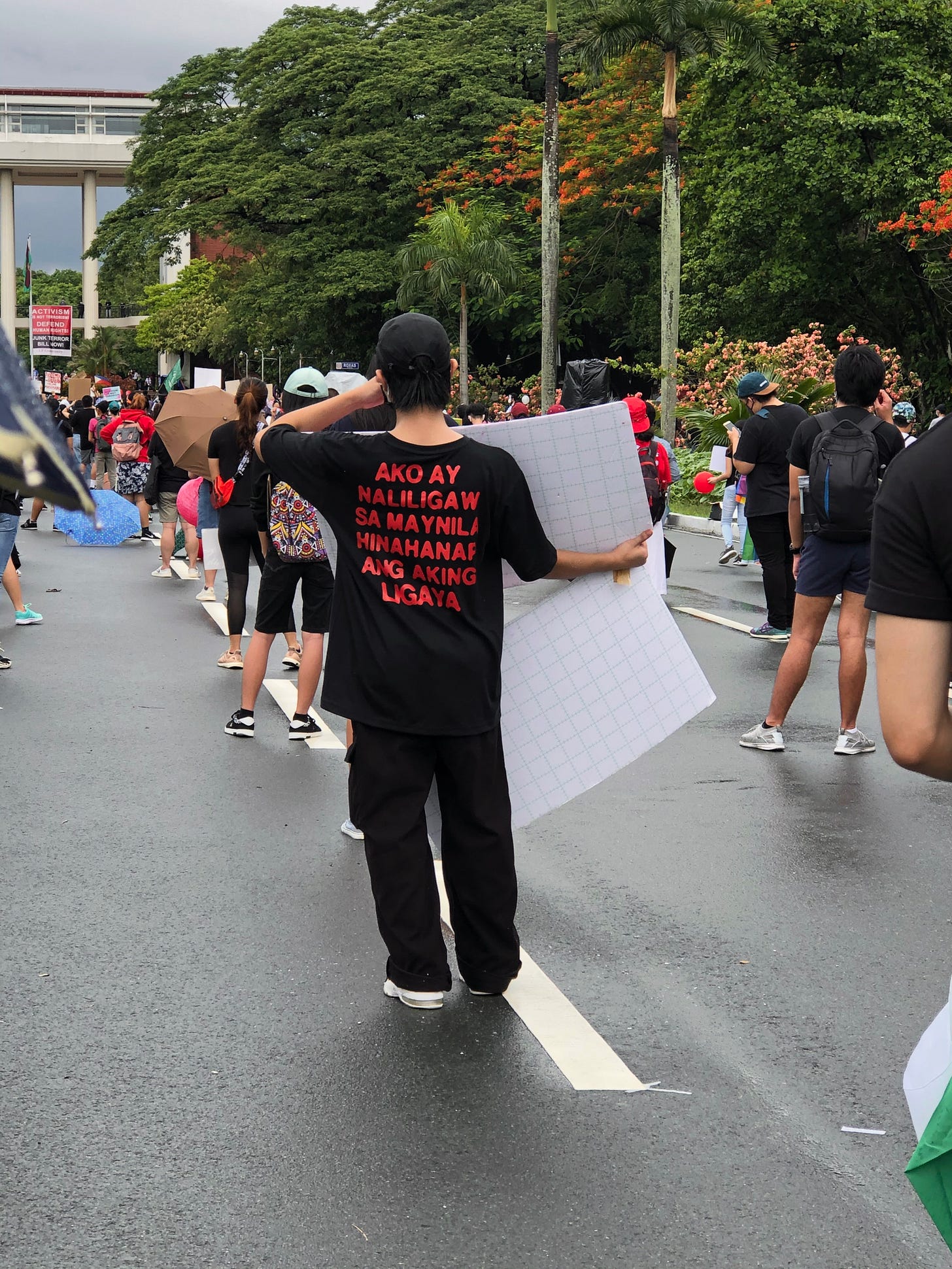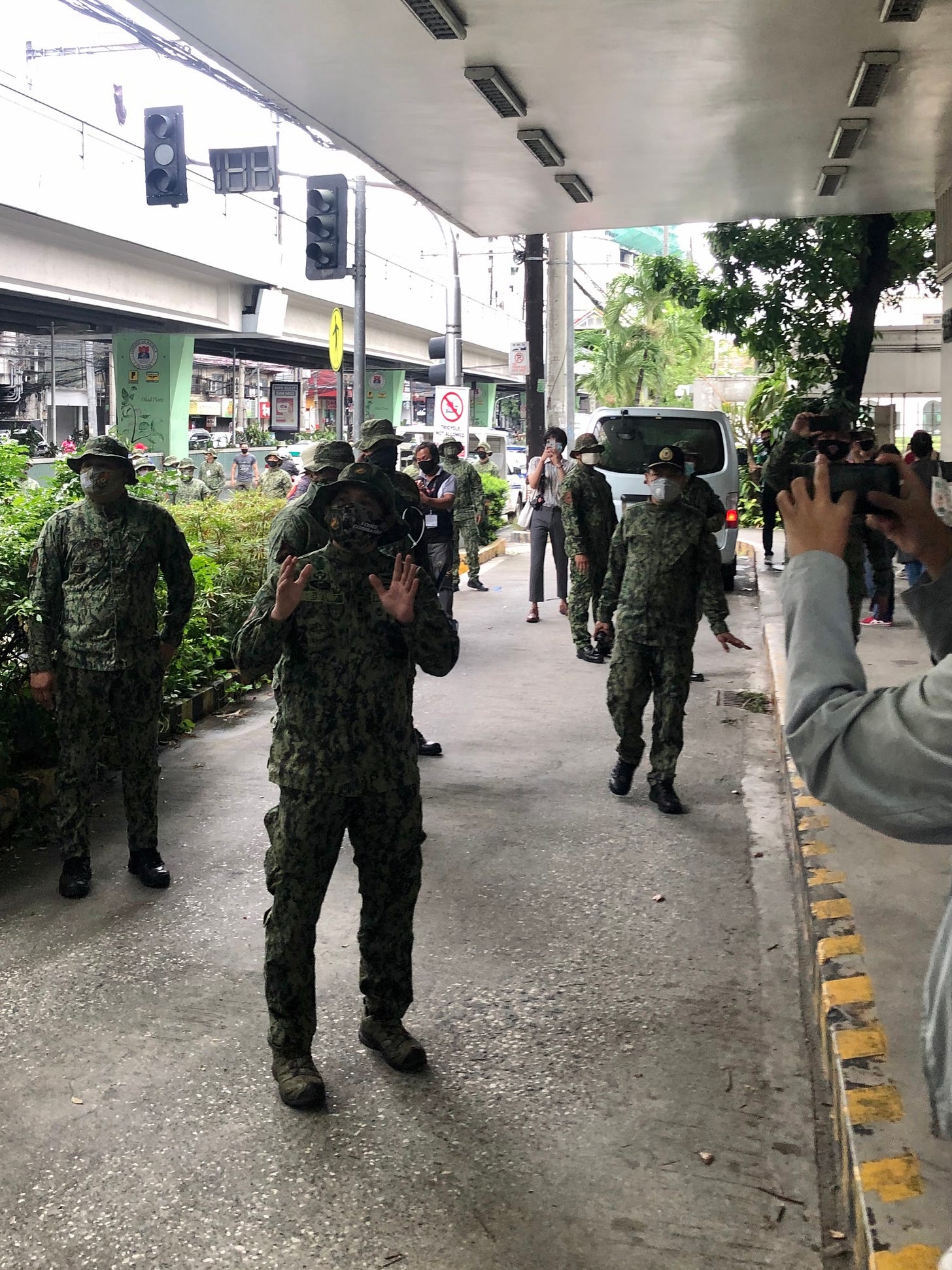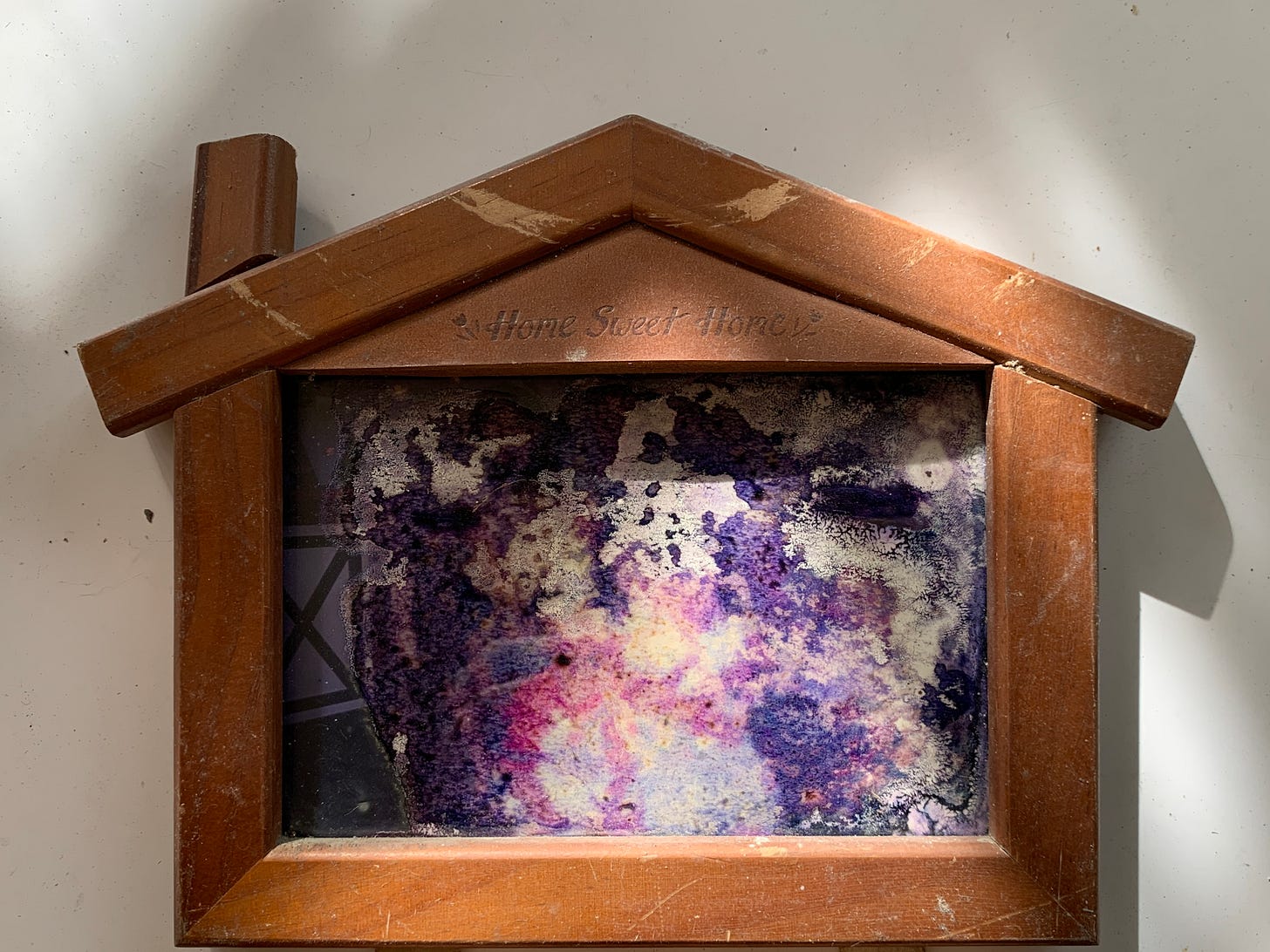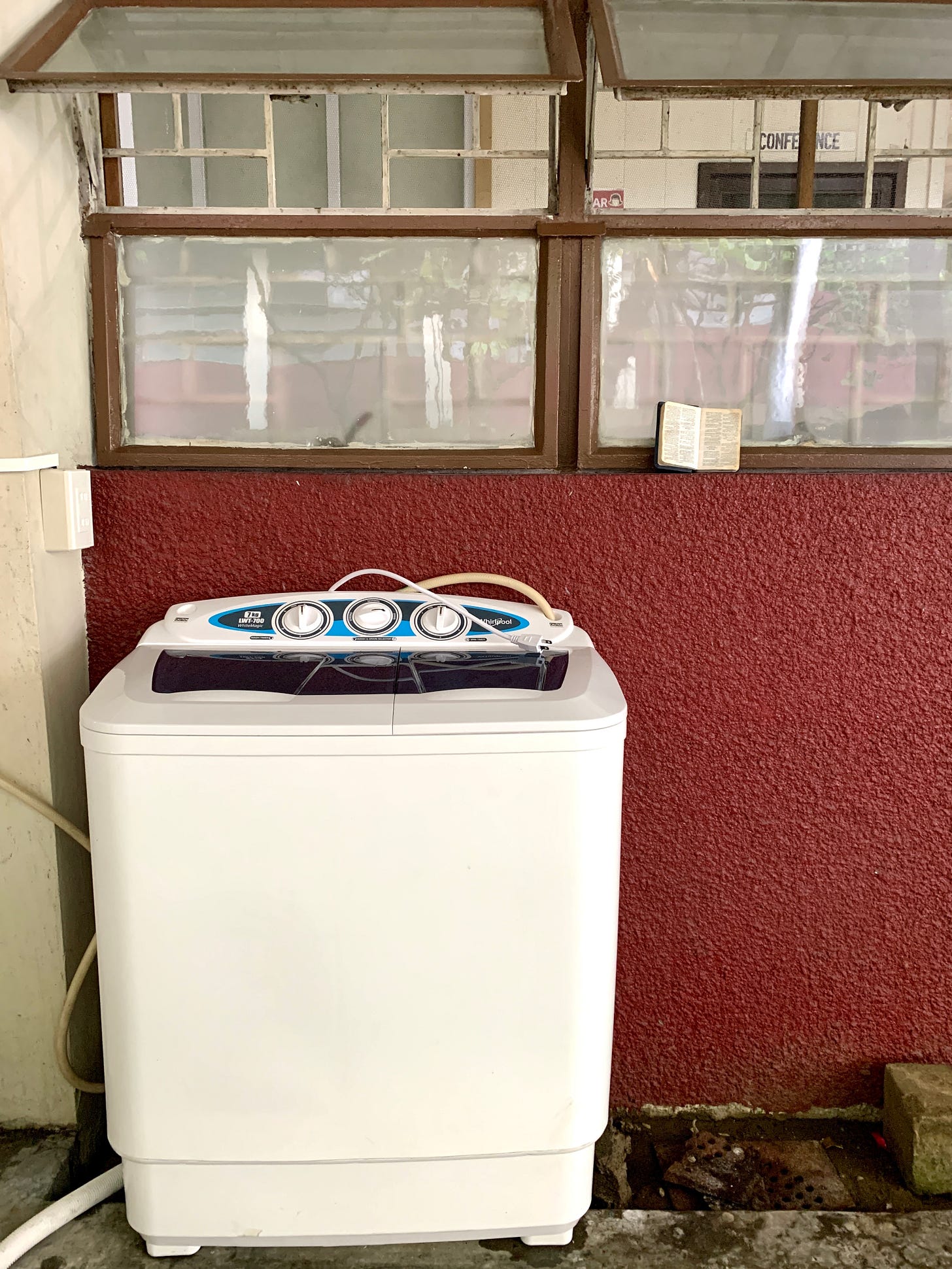In my many years of working in hospitality, I thought that I had fed almost every type of guest from all walks of life. In 2020, I became acquainted with the concept of food as an agency of resistance — it was only then that I understood true hunger. “Magbigay ayon sa kakayahan” (Extend help according to your capacity) is part of Patreng Non’s community pantry slogan, which is a mantra I’ve found myself applying to many aspects of my personal life.
Hi. Welcome to a new year of food and feelings. Thanks for being here.
In my previous post, Namamahay, I mentioned that I was stranded in Manila during the height of Duterte’s terror law proclamation. Even after taking a (very expensive, yes out of pocket) sweeper flight from Sydney, local travel restrictions made it impossible for me to return to any semblance of normalcy. I was scrambling to comply with PNP’s ever-changing requirements and impractical deadlines. In one instance, I had made the drive all the way to Nueva Ecija only to be denied entry. Weeks of going back and forth due to their weaponized incompetence showed me the true plight of being a second-class citizen in my own country.
It was a common sight outside city offices and NAIA for displaced individuals to sleep on makeshift beds made of cardboard boxes. I would wait in line, conversing with them. Most had been laid off from work due to the pandemic. I, in fact, was not displaced in the same aspect. My privilege reeked, and I felt disgusted for having a warm bed to sleep in. In one of my visits to Pasay City Hall, the woman next to me asked if I could help her fill out the forms. Ate Michelle relayed how she had been working as a nanny in Antipolo and was struggling to get home to her family in Bicol. She was a single mom like me, I understood her agony. She said that she had walked all the way from Cubao in hopes that the bus terminals in Pasay were operating. She asked for assistance from countless barangay halls within the vicinity but to no avail.
We were in line for 3 hours, snacking on the biscuits I brought, hopeful of receiving an elusive travel pass until the staff announced that they would be issuing no more. We would have to come back the next day, fall in line, and go through the process all over again. We both sighed in annoyance. She bid me goodbye and wished me luck on getting back to Isabela. “Sana makauwi ka na sa mga anak mo.”, she said. I expressed sentiments of encouragement to help lift her spirit. Three days later, as I was watching the evening news, I found out that Michelle was found unconscious on an overpass and later pronounced dead. I had not known true rage until that moment.
A public outcry emerged because of Michelle’s death. There was also news of an OFW who committed suicide in one of the quarantine facilities. If COVID doesn’t kill you, our government will. I didn’t know how to grieve. Did I even have the right to mourn someone I had only known for a few hours? Wrong question. Would we be in a state of mourning if the systems in place cared for our collective well-being? The grief I carry daily stems deeper than any loss I’ve encountered — living in a country that does not serve nor protect me. The intricate thread of systemic abuse perpetuated by the same habits we engage in seems almost inescapable. We are never done grieving as a nation.
Uncertain how to move forward, I found comfort in the resistance. I was unsure of what to offer but figured that my time and energy were better than nothing. I wanted to be with people who assured me that my anger was justified. I wanted to do and be better. I went to the Independence Day rally in DLSU alone, curious to explore this newfound advocacy. I came with an open, albeit exhausted, heart. No more than thirty of us were there, and I was mortified at the number of SWAT cars surrounding the area. We were commanded to disperse. We held our ground for as long as possible but I panicked internally. There was no way I could outrun that many police. In my mind, my thoughts were swirling. I’m going to get shot. Who the fuck is going to bail me out of jail??? I’m going to die. It wasn’t far from the truth when Metro Manila had an alarming rate of unjust arrests and extrajudicial killings.
There were too few of us to fend for each other, so we left peacefully. Unknown to me, a line of cars were waiting on the other side of the street — private citizens who offered their vehicles for those without means of transportation. I walked past with my sign, and the driver asked me, “Sama ka sa Diliman?” (Are you joining us?). In the middle of a deadly pandemic, I found myself in the backseat of a packed Toyota Avanza, brushing elbows with hardcore activists. They were playing music and chanting as if we didn’t have prison time staring us straight in the eye just a few minutes ago. I began to relax and started singing too. Might as well put on my party hat; we were going to a Mañanita after all.
I started that day with hate in my heart. Towards the end, it softened into a mamon filled with political learnings, found friends, and a renewed sense of nationalism. We sang, cried, and waved our fists in defiance. I realized that the only prerequisite to being an activist was to show up. Care for yourself, your community, and your country. Rage will consume you, compassion is freeing. A riot is useless without a resolution. To end things on a sweeter note, we had a picnic. There was enough ice cream and cake for everyone. ✦
Resilience is a bastardized word in the Filipino context of climate disaster. We see so much suffering and destruction each year during typhoon season. As if 2020 wasn’t enough of a whirlwind year, my province Cagayan Valley, was ravaged by Ulysses (Typhoon Vamco). On the night before the flood, I remember being unable to sleep because of torrential rain. How angry it sounded. How loud it demanded. How strongly Mother Nature wanted to prove that we were silly for thinking our flimsy houses could protect us from her wrath.
I checked on the pets before forcing myself to sleep, knowing there would be fallen branches to clean up in the morning. I woke up to water. The tiny studio we had been building was ruined. Construction materials playing patintero our garden. The house that my siblings and I shared, knee-deep in murky filth. Our belongings swimming in god knows what. The entire subdivision was flooded by canal water. I remember my brothers’ faces as they gaped at the amount of destruction. No words were spoken, but I know we all had the same thought: It was pointless to try to salvage anything.
This was my family’s first time experiencing a natural calamity of this proportion. It never floods in our area. As a teen, I experienced Harurot (Typhoon Imbudo) and lived through weeks without electricity. We’re used to the wind but not water. No one was harmed, and that’s what’s important, masuwerte parin tayo (we’re still lucky), I caught myself saying. This is what Filipinos say when cornered into defeat. But really, what I wanted to scream was: Your ayuda will not restore our soiled photo albums. Mold will appear in every corner of our house and make us sick for years. Our floorboards will rot along with the tiniest sliver of hope I had for this country. That studio will not rebuild itself for free. To this day, I still get panic attacks during a downpour. Rain is not my friend.
No one can prevent a flood from happening, but it’s the LGU’s responsibility to keep everyone safe. A warning had been released the night before, saying that they would release water from Magat Dam. Their rainfall calculation was incorrect, and the next thing we knew, roads were blocked. Bridges overflowed. Landslides brought massive destruction and power outages. Donations were being dropped by helicopters. Hunger games commenced. Many died. The events of 2020 put my privilege into perspective, I started owning it. I shouldn’t have to minimize my pain or feel guilt for how better I have it than others, but I do have the capacity to offer help. Our culture of impunity has conditioned us to shift blame inward. We’re all victims of poor governance.
Unable to cope with what seemed to be an unending streak of loss, I moved to Puerto Princesa under the illusion that a better life was waiting for me somewhere sunny. Before relocating, I had only been there once when I was 16. I knew nothing about the island aside from the touristy memories I had. My tiny probinsyana mind was blown as I was met with vast jungles of tribal heritage. My stay there blossomed into a spiritual relationship with nature.
When my collaboration with The Living Library ended, I decided to keep learning. Palawan suffered greatly during the pandemic due to the lack of tourists. My political advocacy in the kitchen was amplified by the glaring awareness of food scarcity on the island. I still remember how my stomach dropped when I visited their public market for the first time. I was used to a bright and colorful palengke in Isabela, having a plethora of fruits and vegetables to pick from. Theirs had a very limited supply, most of which was old or damaged after being flown in from Manila. I simply could not believe my eyes. That market was not a happy place for me.
I continued to work with local farms and establishments to further my understanding of their sustainability practices. I was in El Nido when Odette (Typhoon Rai) hit. Aside from a gas shortage due to the road blockage in Roxas, El Nido wasn’t severely impacted by the storm. Having no way to get back to Puerto Princesa, I joined a local relief operation in the neighboring town, San Vicente. At that point, I had already experienced volunteering for many kitchens but could never prepare myself for the horrors that awaited me each time.
San Vicente was WRECKED. There was no gas, no power, and no potable water. We managed to bring in some generators and water filters, and then spent three days cooking, packing, and distributing meals to those in need. Trying to keep a straight face while facing people who have lost everything is a different exhaustion than any kitchen service I’ve experienced. It took a lot for me to not weep in front of them. Hugo (my partner in delivering the meals) held our little team together. We congratulated each other for a job well done at the end of each day, but we knew it would never be enough to console those families.
Coming back to a vibrant El Nido party scene was disorienting, to say the least. It became clear that I had much more work to do elsewhere. The decision to leave Palawan stemmed from a sense of security I had built with my connections there. “Leave and then come back. The island will be here for you.”, Andrew said when I confided my plans with him. True enough, two years later, I still have a home there. I am welcomed and celebrated each time I visit. Looking back, I needed that time away to reevaluate my frame of reference for many things: family, resistance, romantic and platonic love. My learnings from my stay there solidified the path that I was on — an ongoing journey towards radical change. ✦
The Jerusalem episode of Parts Unknown remains one of my favorites from the franchise — a graceful narration of faith and hope from a nation that continues to thrive under occupation. Palestinians embody true grit to be able to live in terror and still share bread with their neighbors. I’m deeply moved by how food has kept their culture alive amidst rubble and death. Anyone who is even remotely in touch with reality has been made aware of the genocide happening in Palestine. Social media has made it possible for us to watch and cower in fear of the horrors that fascism instigates. I find myself sobbing at videos of children being martyred for no reason other than greed. Pets scrambling for shelter. Hospitals and heritage sites in ashes. It’s a privilege to even have the option to log out when it all becomes too much to handle.
Witnessing hunger and homelessness is not new to me; we see it every day in the Philippines. The atrocities of US imperialism can be felt on a nationwide scale. We have US military bases all over the country. The Philippines is the leading supporter of Israeli weapons in Southeast Asia. To our dismay, Marcos Jr. enabled this genocide as he made his support of Israel public. Our leaders continue to prioritize military budget allocation over solving our educational crisis, food insecurity, and climate catastrophe. Political unrest will prevail so long as human life is devalued.
Last December, I joined a community kitchen that helped feed the families of Filipino-Palestinian refugees who were housed in UP Diliman. The invitation came at a time when I was dealing with extreme emotional stress. It was an apt reminder to pour myself into something I love. Most days, I wake up asking myself What is this all for? The last time that I cooked for a cause prior to this was in Palawan for a WWF commencement dinner (photos here). It always comes as a surprise to me when I get invited to cook, to be flown into places, to be asked for my helping hand. I struggle with impostor syndrome, knowing I’m only working in kitchens about 30% of the time. Self-doubt takes over my internal monologue; I often question my own capacities. Magbigay ayon sa kakayahan, I tell this to myself whenever self-imposed feelings of scarcity overwhelm me. I make it a point to assess what I have, which is more than enough, and give something away to someone who needs it more.
My life is demanding, but the limited amount of time I spend cooking for others renews my love for service each time. I shook the negative thoughts away and started packing for my trip. Straight from Isabela, I headed to Diliman with my apron, 2 kilograms of flour, a fair amount of spices, and a bag of tupig (rice cake) from Aritao to share with fellow volunteers. I got there around noon and surveyed the area. Families were sprawled all over the dormitory, sharing lunch. Children playing in the courtyard. Mothers drying clothes in the hallway. Student volunteers in deep conversation with the refugees. I hurried to the improvised kitchen, nervous that I had arrived too late. Without even saying hi, Chef Lao instructed me, “Go eat.”
I just got here. “We’re on lunch break. Including you.”, he said. Hesitant at the thought of me being idle, I dismissed his offer and organized the spices I had with me. After making 60 pieces of flatbread, I moved on to prepping the salads. A few hours in, I accidentally cut myself on the mandolin. I calmly inspected the wound and bound it with tissue and cling wrap. I’m guessing it was a little too close for comfort for the other volunteers to see blood because they dizzied into a panic. I was put on time-out, which I resisted. Give me something to do. “Rest. That’s what you should do.”, they said in unison. I was so used to being ON all the time that I forgot some kitchens don’t operate on anxiety and ticking clocks.
In service, cuts and burns aren’t deterrents to accomplishing a task. You aren’t supposed to slow down. Most service kitchens have a separate container of ground pepper where we can dip our fingers to stop the bleeding. Either that or you wash it through running water, squeeze out the excess blood, and seal it with saran wrap. The irony of first aid coming second to sending a dish to the pass gives you a realistic view of how grim the hospitality industry is. I left service kitchens a long time ago because it felt useless to participate in a culture that romanticizes perfectionism to the point of personal exploitation. I can tell you stories that range from exhaustion to manipulation to assault. Bottom line is: a cutthroat career wasn’t helping me take care of myself, and I decided that wasn’t the way I wanted to live.
During my forced time-out, I meditated on what activism truly meant to me and how I still struggle to bridge the gap between cooking and serving others. How my learned professionalism builds walls that hinder me from actively engaging with my community. I like being in the kitchen because it gives me space to breathe. Most people understand that mental focus and silence are necessary in the art of cooking. Community cooking, however (something that I’ve been exploring for the past few years), is rowdy. The kitchen is for everyone. I can’t tell you to go peel vegetables over there because I’m particular about my personal space, or that I can’t hear myself think because you keep conversing. I can’t shut down and hyperfixate on one task. All my coping mechanisms are thrown out the window for a greater goal. It isn’t about me.
I was anxious about supporting this cause because I felt like I didn’t know enough to call myself an ally. It didn’t feel right for me to obsessively consume the media circulating Palestine, most of which Israel spins into a different narrative, so I try to educate myself in gentler ways. Does it matter though? I think we have to reinvent what allyship means in resistance. It’s either you are for the people or you aren’t. Decolonizing my role in the kitchen requires a thorough and recurrent reflection on why I cook. The internal motivation to pursue this passion has changed over time. I had a different outlook when I started this journey 13 years ago. It’s a lucrative career, sure, but at what cost.
Throughout the years, I've developed a different mindset simply because I was in search of something more fulfilling than mouth-stuffing and fatigue. I wanted a life outside of this hustle bubble. Food holds memory, culture, and love. Food is political. It can be slow and thoughtful and imperfect; what matters to me now is the connections made at farms, markets, and dinner tables, the commonalities found in home and service kitchens alike, the purpose of providing not only service but a respectful experience and understanding of food — where it comes from, how it's made, and who keeps us nourished. ✦
Postscript ~ book recommendations for those curious about the role of food in various movements (no spoilers):
Makisawsaw (1st and 2nd edition) - Gantala Press
Nazi Hunger Politics - Gesine Gerhard
Hope this coming year embraces you with abundance.
Patricia ♡
If you appreciate Salu-salo, feel free to share this publication or pledge your support









